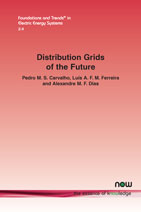Distribution grids of the future: Planning for flexibility to operate under growing uncertainty
By Pedro M. S. Carvalho, Instituto Superior Técnico, INESC-ID Lisboa, Portugal, pcarvalho@tecnico.ulisboa.pt | Luís A. F. M. Ferreira, Instituto Superior Técnico, INESC-ID Lisboa, Portugal, lmf@tecnico.ulisboa.pt | Alexandre M. F. Dias, Instituto Superior Técnico, INESC-ID Lisboa, Portugal, alexandre.f.dias@tecnico.ulisboa.pt
Abstract
In this paper optimal grid design problems are revisited in view of the ongoing transformations in distribution systems. The transformations are those caused by distributed generation, changes in load use, and smart grid operation. These transformations have an expressive impact on the way planning must be carried out. Trends on grid design are advanced to deal effectively with future problems of security of supply in the context of advanced grid operation and demand responsive resources as enabled by grid modernization technologies. Formulations of key optimization problems in grid design are provided together with the required modelling of load behavior. Solution challenges for the key problems are identified and the corresponding stochastic framework for chronological simulation is advanced as favored by a plethora of newly available load-data. Required developments in decision support tools for planning the distribution grid of the future are finally discussed.
Distribution grids of the future: Planning for flexibility to operate under growing uncertainty
Electricity grids are facing significant challenges with new energy sources starting to be integrated into grids on a large scale. Distributed generation, changes in load use, and smart grid operation have each caused transformations in grid design. This monograph revisits optimal grid design problems in view of these ongoing transformations in distribution systems.
The monograph describes how optimization techniques can be used to plan for a flexible electricity grid that can operate under growing uncertainty. It highlights the trends in grid design to deal effectively with future problems of security of supply. Formulations of key optimization problems in grid design are also provided together with the required modelling of load behavior.
Solution challenges for the key problems are identified and the corresponding stochastic framework for chronological simulation is advanced. The book concludes with a discussion on the developments in decision support tools for planning the distribution grid of the future.
Distribution grids of the future provides a succinct overview of the techniques and challenges facing the future of electricity distribution grids. Students, researchers and practitioners working on all aspects of electric energy systems will find this an incisive overview of the near-future challenges they face.
